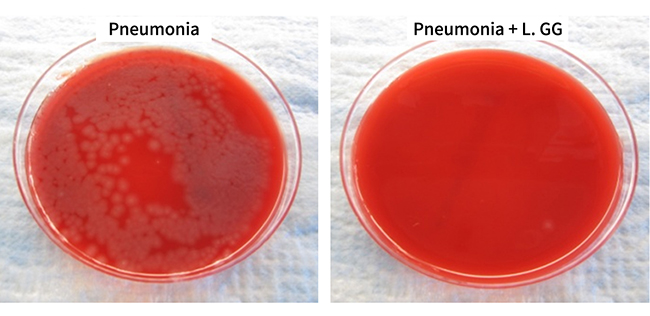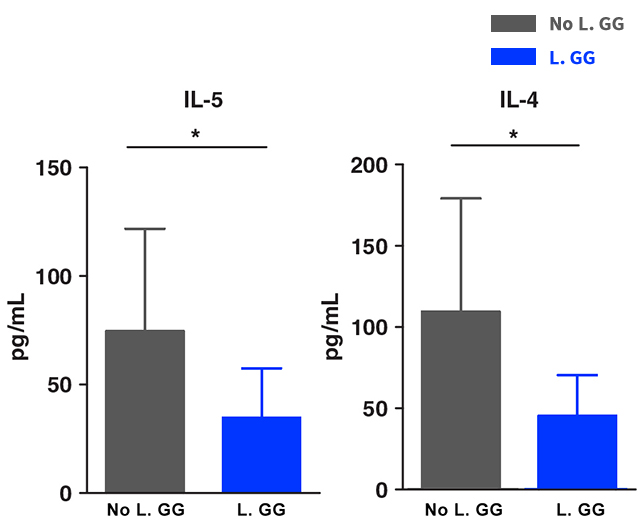Some examples of the GG probioticРђЎs effects on immunity are:
Рђб It sends molecular signals to immune cells, telling them to decrease or increase their activity.
Рђб It stimulates immune cells to fight harmful microbes, such as rotavirus or E. coli, in the intestinal tract.
Protective effect of Lactobacillus GG on small intestines during rotavirus infection.
No RV / RV infection / RV infection + L. GG
Arrows indicate massive loss of intestinal cells due to rotavirus infection.
Small intestines of animals given GG probiotic before rotavirus infection did not show any damage.
RV = rotavirus
[Zhang et al. 2013]
Рђб It stimulates immune cells to attack and overcome harmful germs in the respiratory tract, such as the influenza (Рђўflu) virus.
GG probiotic boosts immune factors (black bars) in the lungs during influenza infection
TNF = Tumour Necrosing Factor
IL-1╬▓ = Interleukin-1L╬▓
MCP-1 = Monocyte chemotatic protein
[Adapted from Harata et al. 2010]

Culture plates showing amount of bacteria in lung fluid from mice with pneumonia. Very few pneumonia bacteria are found in the lungs of mice given GG probiotic
Left plate = mice without Lactobacillus GG. Right plate = mice fed on Lactobacillus GG.
[Khailova et al. 2013]

Microscopic sections of lung. Severity of pneumonia is significantly reduced in the lungs of mice given Lactobacillus GG. [Khailova et al 2014]
Рђб It keeps the bodyРђЎs inflammatory reaction from over-stimulation. Due to this control over inflammation, it protects organs such as the intestines from being injured by a hyperactive immune response.
Effect of Lactobacillus GG on acute inflammation of the large intestine. Microscopic sections of colon from mice fed a chemical substance to rapidly induce inflammation. Mice given GG probiotic suffer much less intestinal inflammation and injury than those without the probiotic.
[Amit-Romach et al. 2008]

Effect of Lactobacillus GG on prolonged inflammation of the large intestine. Microscopic sections of colon from mice fed a chemical substance over a long period to induce prolonged inflammation. Mice given GG probiotic suffer much less intestinal inflammation and injury than those without the probiotic.
[Moon et al. 2008]
Рђб It stimulates the growth of antibody-producing cells, boosting immunity.
Рђб It stimulates the production of immune cells which destroy cancer cells. One of these is called the Natural-Killer (NK) cell.
Рђб When consumed by mothers who are breastfeeding, it stimulates the production of proteins with the ability to modulate immunity, in the breast milk. When their babies breastfeed, these immune factors, such as TGF-╬▓ and s-CD14, enter the babies and reduce allergy.
Рђб It suppresses allergic inflammation in the intestinal tract, lungs, and skin.
 Comparison of allergic immune response between baby mice whose mothers were given Lactobacillus GG before pregnancy, during pregnancy and lactation and those whose mothers did not receive the probiotic. Levels of immune factors in lung fluids were measured.
Comparison of allergic immune response between baby mice whose mothers were given Lactobacillus GG before pregnancy, during pregnancy and lactation and those whose mothers did not receive the probiotic. Levels of immune factors in lung fluids were measured.
Allergic immune factors, IL-4 and IL-5, were suppressed in those whose mothers took GG probiotic.
[Blumer et al. 2007]
References:
Zeng Q et al. Lactobacillus rhamnosus GG conditioned medium prevents E. coli meningitis by inhibiting nuclear factor-╬║B pathway. Nan Fang Yi Ke Da Xue Xue Bao. 2017;37(1):24-29.
Wang H et al. Lactobacillus rhamnosus GG modulates innate signaling pathway and cytokine responses to rotavirus vaccine in intestinal mononuclear cells of gnotobiotic pigs transplanted with human gut microbiota. Microbiol 2016;16:109
Wen K et al. Probiotic Lactobacillus rhamnosus GG enhanced Th1 cellular immunity but did not affect antibody responses in a human gut microbiota transplanted neonatal gnotobiotic pig model. PLoS 2014;9(4):e94504
Iliev ID et al. Immunostimulatory oligodeoxynucleotide containing TTTCGTTT motif from Lactobacillus rhamnosus GG DNA potentially suppresses OVA-specific IgE production in mice. Scand J Immunol 2008;67(4):370-376
Schultz M et al. Immunomodulatory consequences of oral administration of Lactobacillus rhamnosus strain GG in healthy volunteers. J Dairy Res 2003 May;70(2):165-73
He X et al. Lactobacillus rhamnosus GG supernatant enhance neonatal resistance to systemic Escherichia coli K1 infection by accelerating development of intestinal defense. Sci Rep 2017;7:43305
Zhang L et al. Evaluation of Lactobacillus rhamnosus GG using an Escherichia coli K88 model of piglet diarrhoea: Effects on diarrhoea incidence, faecal microflora and immune responses. Vet Microbiol 2010;141:142-148
Zhang Z et al. Protective effects of Lactobacillus rhamnosus GG against human rotavirus-induced diarrhoea in a neonatal mouse model. Pathog Dis. 2013;67(3):184-191
Zeng Q et al. Lactobacillus rhamnosus GG conditioned medium prevents E. coli meningitis by inhibiting nuclear factor-╬║B pathway. Nan Fang Yi Ke Da Xue Xue Bao 2017;37(1):24-29
Gao K et al. Immunomodulation and signaling mechanism of Lactobacillus rhamnosus GG and its components on porcine intestinal epithelial cells stimulated by lipopolysaccharide. J Microbiol Immunol Infect 2017;50(5):700-713
Harata G et al.Intranasal administration of LGG protects mice from H1N1 influenza virus infection by regulating respiratory immune responses. Lett Appl Microbiol 2010;50;597-602
Khailova L et al. Lactobacillus rhamnosus GG Improves outcome in experimental pseudomonas aeruginosa pneumonia: Potential role of regulatory T cells. Shock 2013;40(6):496-503
Khailova L et al. Lactobacillus rhamnosus GG and Bifidobacterium longum attenuate lung injury and inflammatory response in experimental sepsis. PLoS ONE 2014:9(5): e97861
Ammoscato F et al. Lactobacillus rhamnosus protects human colonic muscle from pathogen lipopolysaccharide-induced damage. Neurogastroenterol Motil 2013;25:987-e777
Yoda K et al. Lactobacillus GG-fermented milk prevents DSS-induced colitis and regulates intestinal epithelial homeostasis thru activation of epidermal growth factor receptor. Eur J Nutr 2014;53(1):105-115
Zhang L et al. Lactobacillus rhamnosus GG decreases lipopolysaccharide-induced systemic inflammation in a gastrostomy-fed infant rat model. J Pediatr Gastroenterol Nutr 2006;42:545-552
Donato KA et al. Lactobacillus rhamnosus GG attenuates interferon-╬│ and tumor necrosis factor-╬▒-induced barrier dysfunction and pro-inflammatory signalling. Microbiol 2010;156:3288-3297
Amit-Romach E et al. Multistep mechanism of probiotic bacterium, the effect on innate immune system. Mol Nutr Food Res 2010;54:277-284
Amit-Romach E et al. Therapeutic potential of two probiotics in inflammatory bowel disease as observed in the trinitrobenzene sulfonic acid model of colitis. Dis Colon Rectum 2008;51(12):1828-36
Bonaccorsi E et al. TH17 skewing in the GALT of a Crohn disease patient upon Lactobacillus rhamnosus GG consumption. Immune Lett 2016;170:95-97
Moon G et al. Prophylactic effect of Lactobacillus GG in animal colitis and its effect on cytokine secretion and mucin gene expressions. Korean J Gastroenterol 2004;43:234-245
Kim SO et al. G-CSF-mediated inhibition of JNK is key mechanism for L. rhamnosus-induced suppress of TNF product in macrophages. Cell Microbiol 2006;8(12):1958-1971
Rautava S et al. Specific probiotics in enhancing maturation of IgA responses in formula-fed infants. Pediatr Res 2006;60(2):221-224
Rinne M et al. Effect of probiotics and breastfeeding on the Bifidobacterium and Lactobacillus-Enterococcus microbiota and humoral immune responses. J Pediatr 2005;147:186-191
Cai S et al. Lactobacillus rhamnosus GG activation of dendritic cells and neutrophils depends on the dose and time of exposure. J Immunol Res 2016;2016:7402760. doi: 10.1155/2016/7402760
Kandasamy M et a. Lactobacilli secreting a tumor antigen and IL15 activates neutrophils and dendritic cells and generates cytotoxic T lymphocytes against cancer cells. Cell Immunol 2011;271(1):89-96
Seow et al. Lactobacillus rhamnosus GG induces tumor regression in mice bearing orthotopic bladder tumors. Cancer Sci 2010:101:751-758
Lim BK et al. Chemopreventive effect of Lactobacillus rhamnosus on growth of a subcutaneously implanted bladder cancer cell line in the mouse. Jpn J Cancer Res 2002;93:36-41
Huurre A et al. Impact of maternal atopy and probiotic supplementation during pregnancy on infant sensitization : a double-blind placebo-controlled study. Clin Exp Allergy 2008;38:1342-1348
Rautava S et. al Probiotics during pregnancy and breast-feeding might confer immunomodulatory protection against atopic disease in the infant. J Allergy Clin Immunol 2002;109:119-121
Viljanen M et a. Induction of inflammation as a possible mechanism of probiotic effect in atopic eczema-dermatitis syndrome. J Allergy Clin Immunol 2005;115:1254- 1259
Feleszko W et al. Probiotic-induced suppression of allergic sensitization and airway inflammation is associated with an increase of T regulatory-dependent mechanisms in a murine model of asthma. Clin Exp Allergy 2006;37:498-505
Thang CL et al. Effects of Lactobacillus rhamnosus GG supplementation on cow's milk allergy in a mouse model. Allergy Asthma Clin Immunol 2011;7-20
Toki S et al. Lactobacillus rhamnosus GG and Lactobacillus casei suppress Escherichia coli-induced Chemokine Expression in Intestinal Epithelial Cells. Int Arch Allergy Immunol 2009;148:45-58
Blumer N et al. Perinatal maternal application of Lactobacillus rhamnosus GG suppresses allergic airway inflammation in mouse offspring. Clin Exp Allergy 2007;37:348-357